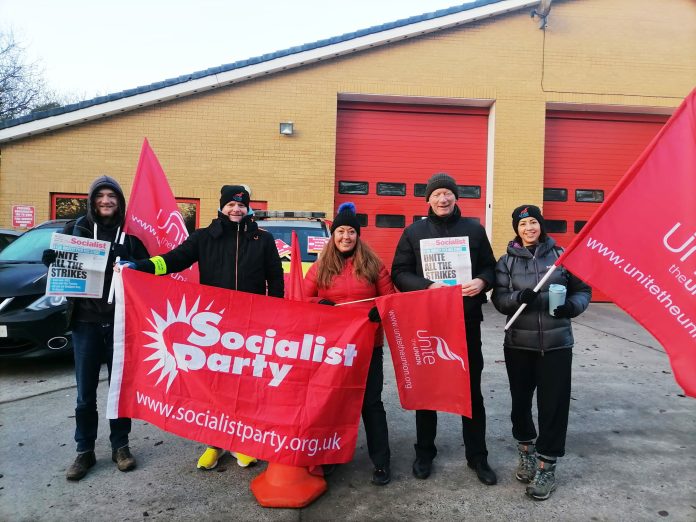National Shop Stewards Network lobby of TUC Special Congress
9-10am Saturday 9 December, TUC Congress House, Great Russell Street, London WC1B 3LS
Aslef train drivers
Members of the train drivers’ union Aslef will be taking strike action between December 1 and 8, with 17 different rail companies affected on different days. Aslef will also carry out an overtime ban between December 1 and 9. This is a continuation of the dispute that has been running for 18 months. The bosses’ rail pay offer made in April included an inadequate 4% pay rise for both 2022 and 2023. But it still included attacks on work arrangements.
A West Midlands train driver writes
‘The Strikes (Minimum Service Levels) Act (MSL) is a major attack on hard-fought-for trade union rights won over generations. Sunak’s Conservative government is attempting draconian, undemocratic measures to curtail the right to strike.
Coming on the back of four decades of brutal Tory anti-union legislation, it is clearly designed to cut across the recent strike wave across all sectors, rather than tackle the causes of the cost-of-living crisis.
The Act allows employers to issue a notice to unions setting out who is required to work during a strike.
As train drivers in many companies are preparing for action, the Tory government’s proposed minimum service level would be 40% of the service – in other words a demand for nearly half of our members to still go to work!
This potentially leaves unions who refuse to comply open to serious financial penalties through sequestration of funds, and removes workers’ protection from being dismissed for undertaking lawful industrial action.
We need to fight for an appropriate industrial response to defend workers’ right to strike and protect any trade union attacked under this new law. No individual union or member should be left isolated and the whole of the trade union movement must mobilise collectively in defence of workers’ rights.
Now more than ever is the time for national mobilisation across the entire workers’ movement. The special Congress called by the Trades Union Congress (TUC) on 9 December should act as a ‘council of war’. We need to build a national plan of resistance across the workers’ movement, including a 24-hour general strike if needed, to not just fight back against MSL but to scrap all anti-union legislation.
Ambulance workers
Gareth Bromhall, Ambulance service worker
Ambulance workers, many of whom took strike action for the first time in the past year, are among those singled out by the government’s draconian ‘minimum service levels’ (MSLs) aimed at strike-breaking.
On 6 November the government announced the outcome of its consultation and outlined proposals for MSLs on the service in England.
Guidance from the GMB, one of the main unions in ambulance services, highlighted the stark reality of these proposals.
MSLs in the ambulance services would be set at as high as 80% of staff, from paramedics and emergency medical technicians (EMTs), to call handlers, dispatchers and support staff. Meaning almost all crews would be forced to work on strike days, and that unions would be expected to ensure members would work under threat of sequestration.
As health is a devolved issue, the reaction of the Scottish and Welsh services differ. The Scottish National Party’s response outflanked Mark Drakeford’s Welsh Labour when it said it would not cooperate with the legislation.
The unions effected by this legislation should pressure Labour-led devolved administrations, local authorities and public bodies not to issue work notices or enact the levels proposed by the Tories.
Starmer has pledged to scrap the new legislation and the Trade Union Act 2016. However, his shadow health secretary Wes Streeting has also pledged to “hold the doors open” for further privatisation of the NHS under a future Labour government. They cannot be trusted.
The overwhelming majority of the public, ambulance staff and NHS staff are against the imposition of these levels on ambulance services.
The TUC is meeting on 9 December in a special Congress to combat this latest attack on our trade union rights, following the resolution passed at Congress in September.
In response to this, the National Shop Stewards Network (NSSN) has welcomed the special Congress and is lobbying for the other points agreed in September to be implemented urgently:
- 100% solidarity with any trade unions attacked
- support for demonstrations and for a national march opposing the legislation
- to explore options for non-compliance and resistance
- to call for repeal of the anti-union laws
Support this lobby, help build the trade union response necessary to fight for our fundamental rights as workers and for the future of our NHS.








